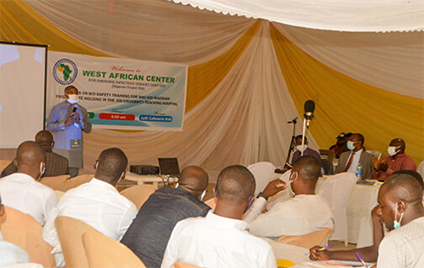While most people spend their lives avoiding mosquitoes, Dr. Scott Weaver has spent his life chasing them. What began as a summer job catching mosquitoes for a research institution near his hometown in Maryland, turned into a lifelong career studying arboviruses—the diseases that mosquitoes and other arthropods carry.
Dr. Weaver grew up in Maryland and obtained his degree in Biology at the College of William & Mary in Virginia. It was here that he took his first course in entomology, a subject in which he would later earn his master’s degree at Cornell University in New York. After working for some years, he decided to pursue a PhD in virology at the University of California, San Diego. A few years after the completion of his degree, he began working at UTMB, focusing on emerging zoonotic diseases.

While at UTMB, he became interested in arboviruses that develop a human-to-human transmission cycle, mainly Dengue, Yellow Fever, Chikungunya, and Zika. Three of these originate in West Africa, which led him to reach out to collaborators like Mawlouth Diallo of the Pasteur Institute in Dakar, Senegal. This began a decades-long collaboration between researchers at UTMB and researchers in Senegal, who had been working on mosquito surveillance programs in the eastern part of the country since the 1970s. With the help of funding from the CREID network, this partnership expanded into the West African Center for Emerging Infectious Diseases (WAC-EID), alongside partners in Sierra Leone and Nigeria. This helped with the establishment of grants for young scientists from these nations to come train at UTMB for roughly six months at a time.
WAC-EID not only investigates arboviruses but has also expanded to study rodent hosts and infections of Lassa virus in humans, identification of potential sources of Ebola and other unknown zoonotic pathogens like coronaviruses and henipaviruses, and the establishment of biocontainment and biosecurity training programs (1). Recent publications from WAC-EID have included the discovery of Dianke virus, a new mesonivirus in eastern Senegal (2), and how a hands-on training course in biosafety in Nigeria improved trainee knowledge and understanding of epidemic and pandemic preparedness (3).
Dr. Weaver notes the differences in research infrastructure across various countries he has worked with and describes them as a major barrier to progress in research. While Senegal’s mosquito surveillance program has been around for many years and is highly efficient, efforts in Sierra Leone and Nigeria have been slower moving because of the need to train scientists and familiarize them with the process of collecting and identifying mosquitoes. The key to understanding the disparity in resources lies also in history and the former colonization of West African nations. This emphasizes the need for additional support to help grow the scientific infrastructure across the globe.
Dr. Weaver explains, “I’ve always had a One Health approach, but I didn’t know it until the word was coined.” The work of Dr. Weaver and collaborators at WAC-EID necessitates the use of One Health perspectives. Studying the transmission of viruses and their life cycles within mosquito populations, primates, and humans—alongside the environmental conditions that impact these factors—is key to gaining a better understanding of how to identify and manage the various approaches to controlling these diseases.
Dr. Weaver is passionate about expanding efforts to better understand viruses in West Africa. There is UTMB infrastructure in Cusco, Peru, that allows researchers to work with an easier process for collaboration with local scientists, and Dr. Weaver would love to see that kind of facility built in West Africa, where there are “a lot of arboviruses and a lot of opportunity to make progress in understanding how to control them.”
References:
- https://www.utmb.edu/waceid/specific-aims
- Diagne MM, Gaye A, Ndione MHD, et al. Dianke virus: A new mesonivirus species isolated from mosquitoes in Eastern Senegal. Virus Res. 2020;275:197802. doi:10.1016/j.virusres.2019.197802
- Davwar PM, Luka DP, Dami DF, et al. One Health epidemic preparedness: Biosafety quality improvement training in Nigeria. Int J One Health. 2023;9(1):10-14. doi:10.14202/ijoh.2023.10-14
